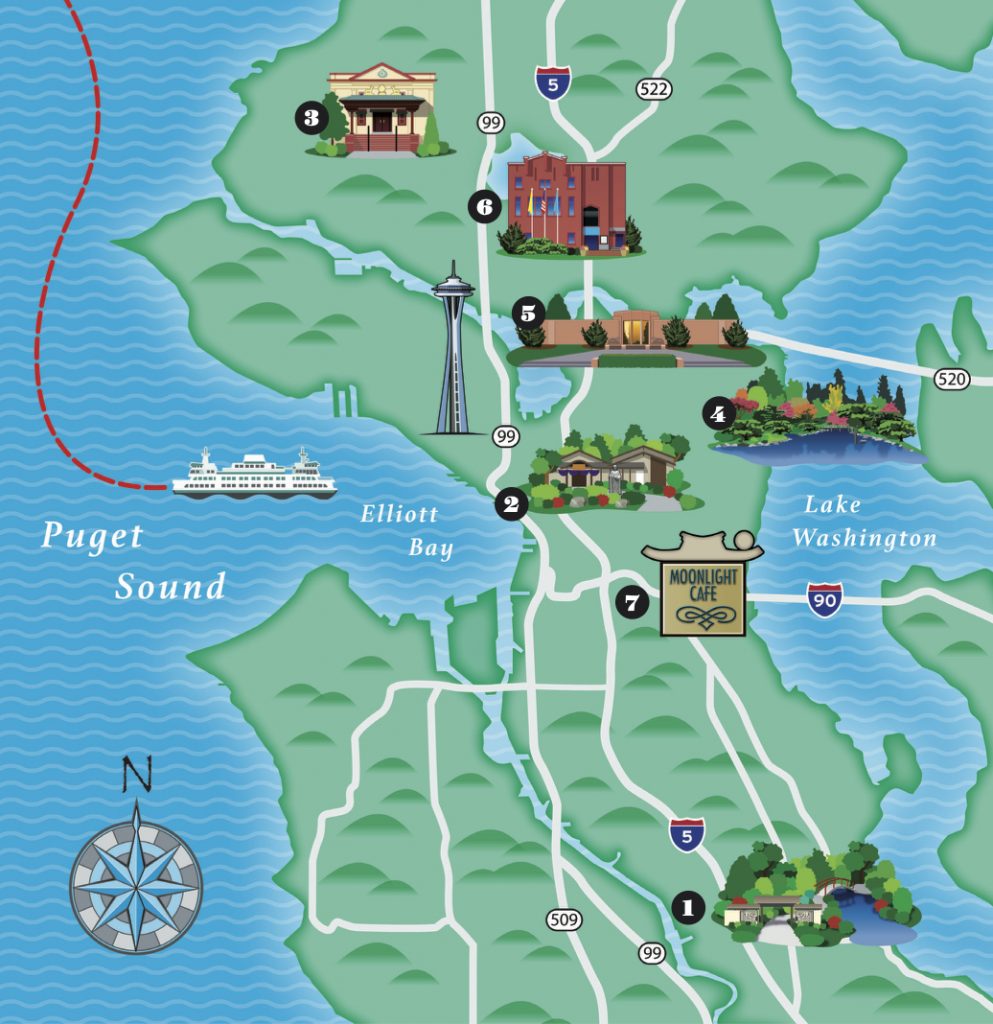Ringed by snowcapped peaks, evergreen forests, and vast bodies of water, Seattle enjoys natural beauty that is as vibrant as its multicultural makeup, and both have plenty to offer Buddhist visitors. The city’s Buddhist traditions began with Chinese and Japanese immigrants in the 19th century. Reverend Kakuryo Nishijima, cofounder of the San Francisco Buddhist Mission, performed Seattle’s first Jodo Shinshu Buddhist service in 1901, and though often faced with adversity, Buddhist temples have thrived in the city ever since. Modernization has altered the city’s character, but it hasn’t diminished its cultural and spiritual offerings.
1| Kubota Garden
A fifteen-minute bus ride from downtown, Kubota Garden is a soothing and beautiful destination for Buddhist and non-Buddhist visitors alike. The garden was built in 1927 by Fujitaro Kubota (1879–1973) and developed into a cultural center that was purchased by the city in the 1980s. Though the flora is influenced by traditional Japanese gardens, the largely self-taught Kubota also designed the garden with aspects of the Pacific Northwest’s natural environment in mind, including mountainscapes and waterfalls.
9817 55th Ave S.
2| Seattle Koysan Buddhist Temple
A few blocks from the International District, this Shingon temple was founded in 1949. The temple is led by Reverend Taijo Imanaka. Koyasan primarily serves the Japanese community, but English is spoken, and it’s a welcoming, inclusive environment. There are regularly scheduled meditation sessions and a monthly Goma fire ritual. Koyasan is only two blocks north of the even older Seattle Betsuin Buddhist temple, which temporarily closed in early 2024 due to fire damage. Both are worth a visit.
1518 S. Washington St.
3| Sakya Monastery of Tibetan Buddhism
Though a bit off the beaten path, in the Greenwood neighborhood, the Sakya Monastery has an illustrious history and a warm, compassionate community. Founded in 1974 by His Holiness Jigdal Dagchen Sakya Rinpoche (1929–2016) and his uncle, Dezhung Rinpoche, the center has hosted many lamas from other schools of Tibetan Buddhism, including the Dalai Lama. There are scheduled meditations and many special ceremonies, some open to the public, and also scheduled services on Zoom. The center also provides a library of resources for those new to Tibetan Buddhism.
108 NW 83d St.
4| Seattle Japanese Garden & Arboretum
Created by Japanese landscape architect Juki Iida in 1959, this formal Japanese garden was designed with tranquility in mind, including rules and etiquette to keep it quiet. It features a Shoseian tea house, with tea services every Saturday (and sometimes on Friday and Sunday), a koi pond, and plenty of peaceful spots for contemplation. The garden is closed from December through February, but it’s set within Washington Park Arboretum, which is open year-round. With winding paths through forests, gardens, and the shore of Union Bay on Foster Island, it’s a few miles northeast of downtown, in Seattle’s Broadmoor and Madison Valley neighborhoods.
1075 Lake Washington Blvd E.
5| Seattle Asian Art Museum
Set within picturesque Volunteer Park on Capitol Hill in an art deco building that once housed the main Seattle Art Museum (SAM) collection, the Seattle Asian Art Museum (SAAM) is a treasure trove of Buddhist art. Though SAM also houses some Asian artifacts, SAAM focuses exclusively on Chinese, Indian, Himalayan, Japanese, Korean, and Southeast Asian art and artifacts. The collection also includes nonreligious and contemporary art. SAAM is a museum of manageable size; you can see most of it in a few hours without being overwhelmed, and when you’re done, Volunteer Park awaits.
1400 East Prospect St.
6| Nalanda West
Nalanda West is housed in a stately brick building that was once a church in the lively and bohemian Fremont neighborhood. Founded by Dzogchen Ponlop Rinpoche of the Karma Kagyu lineage, in 2004, the center’s diverse Buddhist programming is inspired by the ancient Nalanda University in India. Nalanda West offers meditation, study groups, and dharma classes, and hosts Yoga classes, retreats, concerts, contemplative art installations, and ikebana (flower arranging). The building doubles as the headquarters of Ponlop Rinpoche’s Nalandabodhi International organization.
3902 Woodland Park Ave N.
7| Moonlight Cafe and ChuMihn Tofu & Vegan Deli
The Chinatown-International District and adjacent Yesler Terrace are the historic heart of Asian culture in Seattle. Early Chinese, Filipino, and Japanese immigrants settled here, and more from Southeast Asia followed after 1965. On the western edge of Yesler, Moonlight Cafe has been serving delicious Vietnamese bistro cuisine since 1995. A few blocks west, ChuMinh Tofu & Vegan Deli serves similar fare of high quality. It’s a take-out place and also offers a buffet, both good options for folks in a hurry. Both offer vegetarian, vegan, and meat options.
1919 S. Jackson St.
1043 S. Jackson St.
Thank you for subscribing to Tricycle! As a nonprofit, we depend on readers like you to keep Buddhist teachings and practices widely available.
